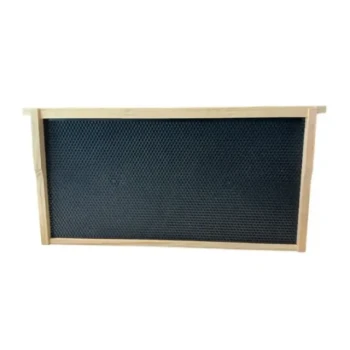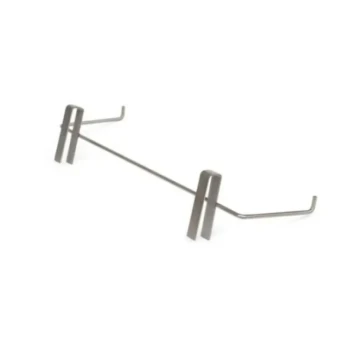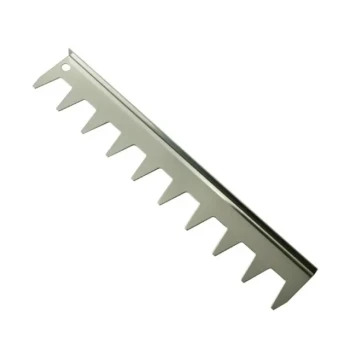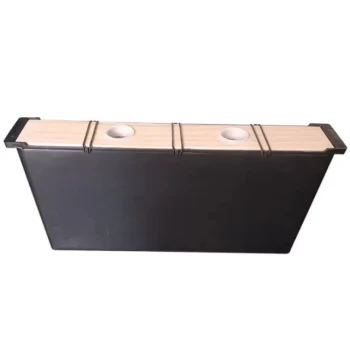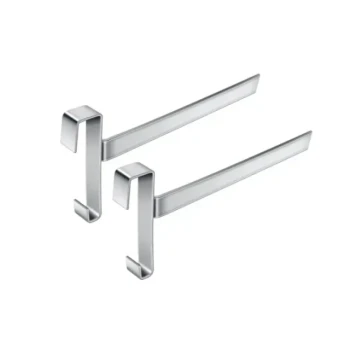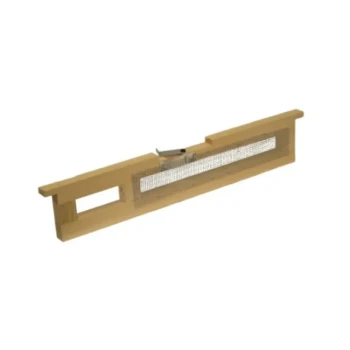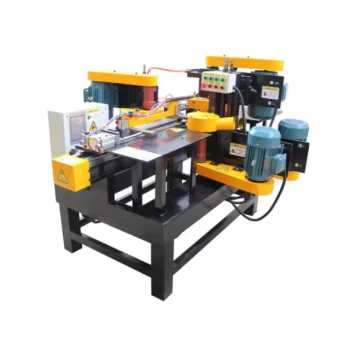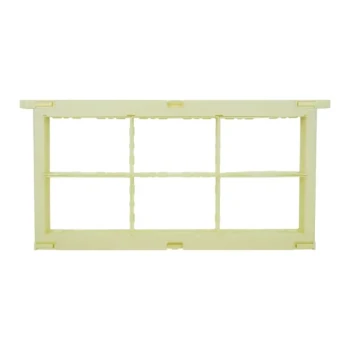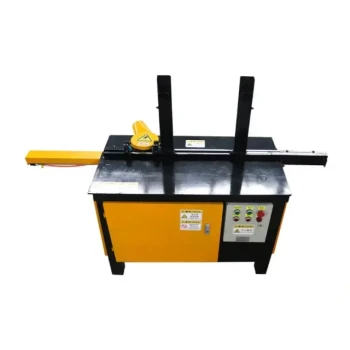In beekeeping, the choice of frame material is a foundational decision. The primary advantages of plastic frames are their exceptional durability, reusability, and immediate convenience. They arrive ready-to-use without assembly, withstand pests and harsh cleaning methods, and offer a longer service life, which can reduce long-term costs and labor for the beekeeper.
The core decision between plastic and wood frames is not about which is "better," but about balancing the beekeeper's need for operational efficiency against the bees' natural preferences and the beekeeper's desire for management flexibility.
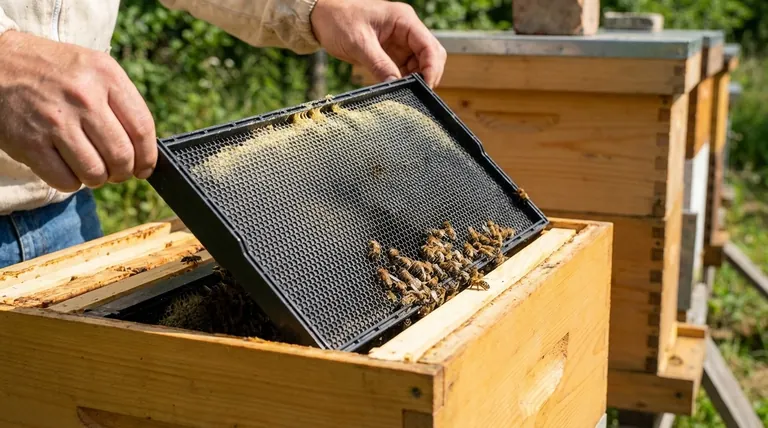
The Case for Plastic: Efficiency and Durability
Plastic frames present a compelling argument for beekeepers who prioritize time savings, longevity, and ease of management. Their benefits are most apparent in their physical resilience and streamlined workflow.
Unmatched Durability and Longevity
Plastic frames are tough. Unlike wood, they do not rot or break easily during inspections or honey extraction.
This inherent strength means they have a much longer lifespan and require less frequent replacement, leading to direct cost savings over the life of the apiary.
Significant Labor and Time Savings
Perhaps the most immediate benefit is that plastic frames typically come as a single, molded unit with the foundation integrated. This completely eliminates the time-consuming process of assembling wooden frames and wiring foundations.
Furthermore, cleaning is remarkably efficient. After a pest infestation or for routine maintenance, plastic frames can be scraped clean with a hive tool or even pressure washed, then reused after a fresh coating of wax.
Resilience Against Pests
While not a preventative measure, plastic's durability is a major asset in pest management. If a colony is lost to wax moths, for example, the plastic foundation remains intact.
You can simply scrape or wash the remnants away and reuse the frame, whereas a natural beeswax foundation would be completely destroyed, requiring total replacement.
Understanding the Trade-offs: Plastic vs. Wood
The efficiency of plastic comes with significant trade-offs that are critical to understand. The choice impacts not only your workflow but also bee behavior and your flexibility as a beekeeper.
Bee Acceptance and Natural Preference
This is the most significant drawback. Bees do not readily accept bare plastic. For them to build comb on a plastic foundation, it must be coated with a layer of beeswax.
Even when waxed, bees will almost always show a preference for natural beeswax foundation over plastic if given a choice within the same hive.
System Rigidity vs. Flexibility
Wooden frames offer modularity. You can pair them with beeswax foundation, plastic foundation, or even no foundation at all (foundationless beekeeping). This allows you to adapt your strategy as you learn.
Plastic frames are an integrated system. The plastic foundation is part of the frame itself and cannot be substituted, locking you into one specific approach.
Repairability and Heat Tolerance
A broken wooden frame can often be repaired with a bit of wood glue and a nail. A broken plastic frame is typically a total loss.
Additionally, under intense heat, such as being left in a car on a hot day, dark-colored plastic frames can warp irreparably, rendering them useless.
The "Natural Beekeeping" Philosophy
For many beekeepers, a core part of the practice is creating the most natural environment possible for the bees. In this context, wood is seen as a more eco-friendly and "bee-friendly" material.
Wooden frames are the only option if your goal is to use a traditional, pure beeswax foundation without any plastic components in the hive.
Making the Right Choice for Your Apiary
Your decision should be guided by your specific goals, the scale of your operation, and your personal beekeeping philosophy.
- If your primary focus is operational efficiency and scale: Plastic frames are a superior choice due to their durability, low maintenance, and long-term cost savings.
- If your primary focus is natural beekeeping or maximum flexibility: Wooden frames are the correct path, allowing for pure beeswax foundations and greater adaptability.
- If your primary focus is minimizing upfront work as a beginner: Ready-to-use plastic frames offer the fastest path to getting a hive started, but you must coat them with wax and understand their long-term limitations.
Ultimately, the best frame is the one that aligns with your specific goals and management style.
Summary Table:
| Advantage | Description |
|---|---|
| Durability & Longevity | Resists rot, breakage, and pests; offers a longer service life than wood. |
| Labor & Time Savings | Pre-assembled with integrated foundation; easy to clean and reuse. |
| Pest Resilience | Can be scraped or pressure-washed clean after an infestation. |
| Immediate Convenience | Ready-to-use out of the box, ideal for scaling operations quickly. |
Ready to upgrade your apiary's efficiency and durability?
At HONESTBEE, we supply high-quality, durable plastic beehive frames and other essential beekeeping supplies designed for the demands of commercial apiaries and distributors. Our wholesale-focused operations ensure you get the reliable equipment you need to maximize productivity and minimize long-term costs.
Contact HONESTBEE today to discuss your bulk supply needs and see how our plastic frames can benefit your operation.
Visual Guide
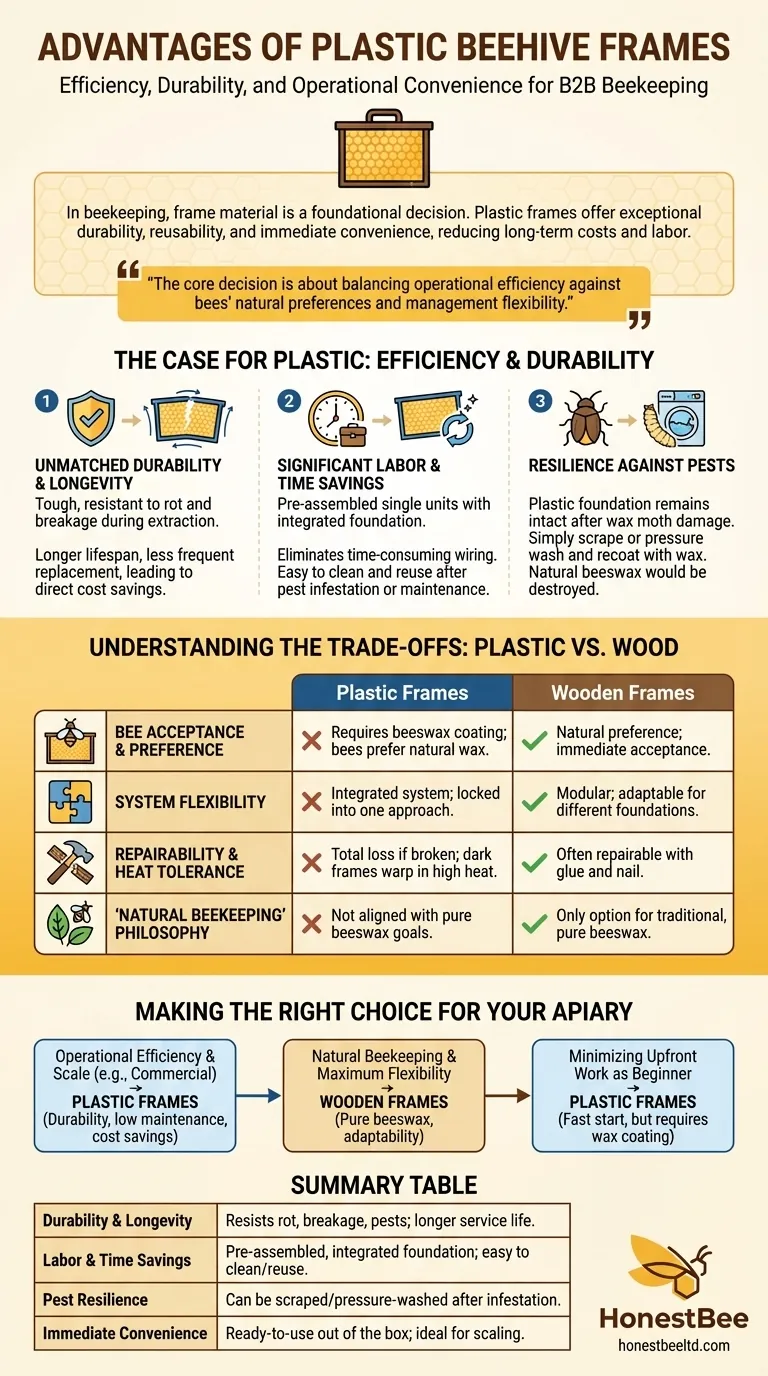
Related Products
- Plastic Bee Frame Beekeeping Hive Frames for Wholesale
- 7 x Auto Bee Flow Hive Frames Plastic Beekeeping Hive Box Supplies
- Assembled Wooden Bee Frames with Plastic Foundation for Durability and Convenience by HONESTBEE
- Heavy-Duty Stainless Steel Clip-On Frame Perch
- Stainless Steel 9 Frame Hive Spacer Durable Precise for Commercial Beekeeping
People Also Ask
- Are plastic bee hive frames good? A Guide to Modern Durability vs. Natural Appeal
- Can beekeepers switch between wooden and plastic frames? Optimize Your Hive's Performance
- What is the role of oxalic acid in plants? A Key to Plant Defense and Internal Regulation
- Why are plastic frames popular in commercial beekeeping? Boost Efficiency & Durability at Scale
- What are the pros of using plastic frames in beekeeping? Boost Efficiency & Durability


